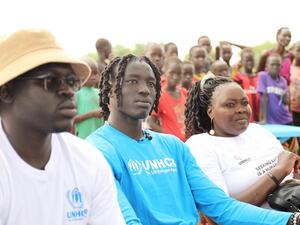Pakistan: New population movements
Pakistan: New population movements
There have been new outflows of people from Pakistan's South Waziristan region this week in anticipation of military operations against insurgents. They join civilians who fled to the Dera Ismail Khan and Tank districts of the North West Frontier Province (NWFP) between May and August this year. As of early September, more than 80,000 displaced people (11,000 families) from South Waziristan had been registered by local authorities in Dera Ismail Khan and Tank. They are staying with host families or have rented rooms.
In recent days, local authorities have begun registering new arrivals, with more than 800 families registered over the past three days out of an estimated 2,000 families that have moved into the area. While some of the movement from South Waziristan may be seasonal migration, most families say they are fleeing expected bombardments. If full-scale military operations are launched, the numbers of displaced people are likely to rise significantly.
As part of an inter-agency effort, UNHCR has been working with local partners to distribute relief supplies (such as plastic sheets, sleeping mats, jerry cans and kitchen sets) to displaced people from South Waziristan. In September, we distributed relief items to more than 6,500 people through our local partners.
UNHCR has stocks of relief supplies in the area to assist new waves of displaced people, more can be dispatched within 24 hours from various stockpiles in Pakistan. But the key challenge is security and humanitarian access to people. We don't expect further outflows of people on the scale that we saw coming out of Swat, Buner, Shangla and Dir earlier this year, when more than 2 million people had fled their homes. But there will be additional operational challenges because of the volatile security environment in areas of displacement as well as in South Waziristan itself.
Due to security concerns, UN agencies have established a joint humanitarian hub in Bakhar, across the Indus River from Dera Ismail Khan in the Punjab province, and UNHCR is distributing relief through local partners.
Meanwhile, there are fresh waves of displacement from Bajaur agency, also in the Federally Administered Tribal Areas (FATA), with reports that an estimated 1,000 families have already left the area. We expect that, of these, some 500 families could be located at Wali Kandow camp in neighbouring Lower Dir district, and are sending tents to accommodate the new arrivals. The camp had been recently vacated by people who had returned to Swat and other parts of Dir. Additional families could also be located at Munda camp in Lower Dir also recently vacated or Jalozai in Nowshera, where some 50 families from Bajaur have recently been accommodated. Still other displaced families are likely to find shelter with extended kin networks or host communities.
The deteriorating security situation in Pakistan continues to hinder our humanitarian operations in the country, including our ability to assess needs, and provide and monitor relief assistance. We have had to adjust our operations in the wake of attacks on UN staff and general insecurity, but we are committed to continuing our work to help displaced people in Pakistan.








